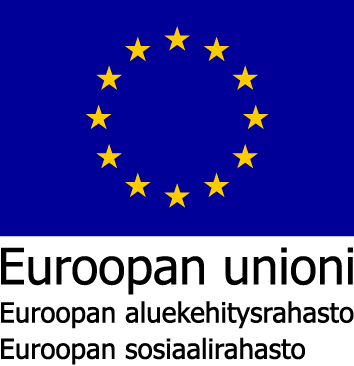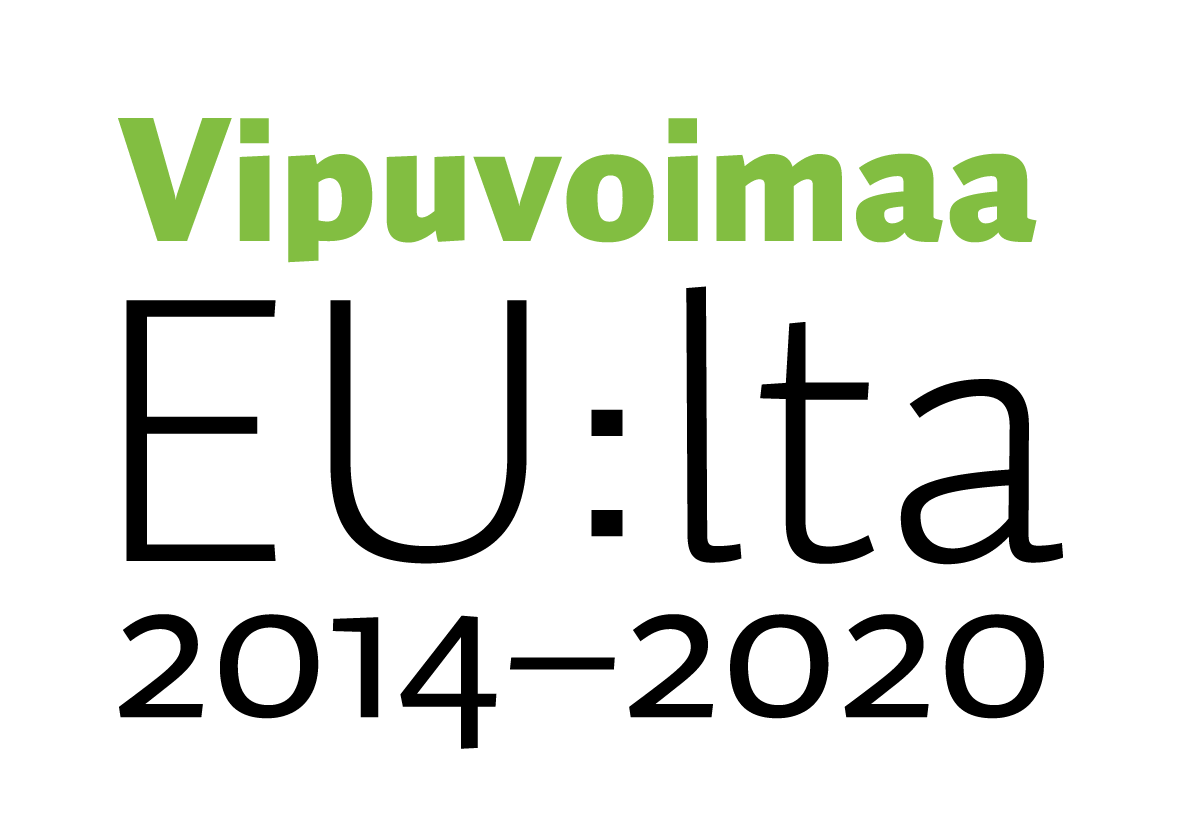

 |
 |
Hankekoodi: S20302
Hankkeen nimi: SOFFAN - Sosiaalisella muotoilulla uusia ratkaisuja ja menetelmiä työllistämiseen
Toimintalinja: 3. Työllisyys ja työvoiman liikkuvuus
Erityistavoite: 6.1. Nuorten ja muiden heikossa työmarkkina-asemassa olevien työllistymisen edistäminen
Suunnitelman mukainen toteutusaika: Alkaa 1.1.2015 ja päättyy 1.1.2019
Toiminnan tila: Toiminta päättynyt
Vastuuviranomainen: Keski-Suomen elinkeino-, liikenne- ja ympäristökeskus
Hakijan virallinen nimi: Kokkotyö-säätiö
Organisaatiotyyppi: Säätiö
Y-tunnus: 1786351-5
Jakeluosoite: Yrittäjäntie 2
Puhelinnumero: (06) 824 0000
Postinumero: 67100
Postitoimipaikka: Kokkola
WWW-osoite: http://www.kokkotyo.fi
Hankkeen yhteyshenkilön nimi: Sanna-Mari Levijoki
Yhteyshenkilön asema hakijaorganisaatiossa: toimitusjohtaja (v.a)
Yhteyshenkilön sähköpostisoite: sanna-mari.levijoki(at)kokkotyo.fi
Yhteyshenkilön puhelinnumero: 050 352 5860
Hakijoiden lukumäärä tai tuen siirto -menettely:
Hankkeen tavoitteena on kehittää uusi toimintamalli Pietarsaaren seudun työpajoille ja seutukunnan kunnille. Toimintamalli nopeuttaa kaikkein vaikeimmassa asemassa olevien työttömien työllistymistä. Työpajoille luodaan ja mallinnetaan tuotantoprosessi, joka vastaa nykyistä paremmin valmentautujien työkykyjä ja taitoa ja mahdollistaa osallistumisen tuotantoprosessiin toimintakyvyn ollessa heikko.
Valmennuksellisen ja osallistavan tuotantoprosessin kehittämisessä otetaan käyttöön sosiaalisen muotoilun periaatteita työpajatoimintaan niin, että sosiaalinen vahvistaminen, kestävä kehitys ja osallisuus otetaan huomioon tuotteiden ja palvelujen suunnittelussa, menetelmissä ja prosesseissa. Sosiaalisen muotoilun keskeinen periaate on yhdistää sosiaalinen ja inhimillinen pääoma uusiin taloudellisesti kannattaviin tuotteisiin ja prosesseihin. Kokemusten mukaan kestävän kehityksen ja osallistavan sekä vuorovaikutteisen muotoilun ja tuotantoprosessin avulla on saatu hyviä kokemuksia yksilötasolla. Tavoitteena on hankkia ja levittää tietoa sekä luoda toimintamalleja Suomeen, jotka perustuvat sosiaalisen muotoilun periaatteisiin.
Hankkeen avulla alennetaan kynnystä osallistumiselle ja osallisuudelle työelämään ja yrittäjyyteen sekä pyritään nopeuttamaan valmennusprosessia niin, että työpajajaksot saadaan lyhemmiksi ja työttömyys katkeamaan.
Hankkeessa testataan ja mallinnetaan menetelmät tuotannollisen toiminnan järjestämiseksi Pietasaaren seudun työpajoissa uudella tavalla nykyisen markkinalähtöisen tuotantotoiminnan rinnalle. Hankkeen aikana pyritään löytämään uusia tuotteita ja palveluja jotka työpajat ja niitä lähellä olevat yritykset voivat tuottaa uuden osallistavan tuotantoprosessin avulla ja siten jatkossa työllistää haastavassa työmarkkina-asemassa olevia työttömiä. Hankkeen aikana ja tuloksena syntyy sosiaalisia yrityksiä jotka työllistävät hankkeeseen osallistuneita valmentautujia.
Työpajojen henkilöstö ja erityisesti työvalmentajat saavat uusia elementtejä pajojen toimintaan, sekä uutta osaamista joka palvelee tuotekehitystä ja siten pajojen taloudellista toimintaa, mutta ennen kaikkea valmennustoiminnan kehittämistä.
Hankkeessa luodaan edellytykset ja mallit uudelle sopimuskäytännölle työpajojen, syntyvien sosiaalisten yritysten ja kuntien välille.
Hankkeen aikana hankitaan ja levitetään tietoa, kokemuksia ja osaamista sosiaalisesta muotoilusta sekä kumppanuuteen perustuvasta sopimuskäytännöistä työpajojen, sosiaalisten yritysten ja kuntien välille. Lisäksi uusia toimintamalleja kokeillaan ja pilotoidaan työpajoilla ja yrityksissä jonka jälkeen ne ovat siirrettävissä. Kierrätystoimintaa harjoittavissa työpajoissa luodaan uusiotuotteita kierrätysmateriaalista muotoilijan avulla. Kierrätystoiminnassa opitaan tunnistamaan uusiotuotteisiin soveltuvia materiaaleja ja ottamaan ne talteen ja hyötykäyttöön. Näin prosessiin osallistuminen on valmentautujille merkityksellistä ja motivoivaa ja lisää työllistymisen edellytyksiä.
Toimintamalli monipuolistaa ja edistää välityömarkkinatoimijoiden toimintaa Pietarsaaren seutukunnassa ja nopeuttaa pitkäaikaistyöttömien työllistymistä.
Hankkeen kohderyhmänä on ensisijaisesti heikossa työmarkkina-asemassa olevat, pitkään työttömänä olleet kaiken ikäiset henkilöt, jotka jo ovat tai ovat ohjautumassa työpajojen toimenpiteisiin kaupungin sosiaalitoimen, työvoiman palvelukeskuksen ja te-toimiston kautta.
Työpajojen johto ja työntekijät, ensisijaisesti työvalmentajat, jotka ovat mukana kehittämässä, suunnittelemassa ja toteuttamassa uutta tuotantoprosessia ja toimintamallia työpajalle, sekä yhteistyökumppaneiksi sitoutuneet yritykset. Kuntakentän toimijat, jotka saavat tietoa ja taitoa kehittää yhteistyötä työllistämisorganisaatioiden ja sosiaalisten yritysten kanssa sekä hankintaan liittyviä uusia menettelytapoja jotka osaltaan vahvistavat yrittäjyyttä sosiaalisella alalla.
Myönnetty EU- ja valtion rahoitus: 460 512
Toteutunut EU- ja valtion rahoitus: 416 640
Suunniteltu julkinen rahoitus yhteensä: 575 715
Toteutunut julkinen rahoitus yhteensä: 520 867
Maakunnat: Pohjanmaa
Seutukunnat: Jakobstadsregionen
Kunnat: Pietarsaari, Kruunupyy, Uusikaarlepyy, Pedersören kunta, Luoto
Jakeluosoite: Retro, Vaunusepäntie 17 Pietarsaari ja After Eight, Isokatu 6 Pietarsaari
Postinumero: 68600
Postitoimipaikka: Pietarsaari
Suunniteltu: 16
Toteutunut seurantatietojen mukaan: 14
Suunniteltu: 70
| Välitön | Välillinen | |
| Ekologinen kestävyys | ||
| Luonnonvarojen käytön kestävyys | 5 | 6 |
| Kierrätystoiminnassa otetaan talteen ja kierrätetään sellaista materiaalia jota voi uusiokäyttää ja siten säästää luonnonvaroja pidemmällä tähtäimellä. | ||
| Ilmastonmuutoksen aiheuttamien riskien vähentäminen | 4 | 4 |
| Toiminnan tavoitteena on vaikuttaa laajasti kestävään kehitykseen, sosiaaliseen muotoilun toimintaperiaatteisiin kuuluu vähentää kaikkia riskejä jotka vaarantavat sitä. | ||
| Kasvillisuus, eliöt ja luonnon monimuotoisuus | 0 | 0 |
| Ei vaikutuksia. | ||
| Pinta- ja pohjavedet, maaperä sekä ilma (ja kasvihuonekaasujen väheneminen) | 0 | 0 |
| Ei vaikutuksia. | ||
| Natura 2000 -ohjelman kohteet | 0 | 0 |
| Ei vaikutuksia. | ||
| Taloudellinen kestävyys | ||
| Materiaalit ja jätteet | 8 | 8 |
| Toiminnan ja tuotannon uudelleenjärjestely sosiaalisen muotoilun avulla lähtee jätteen uudelleenkäytön mahdollisuuksien arvioinnista, tunnistamisesta ja hyödyntämisestä | ||
| Uusiutuvien energialähteiden käyttö | 6 | 6 |
| Tuotesuunnittelussa ja -kehityksessä suositaan materiaaleja ja menetelmiä jotka perustuvat uusiutuvien energialähteiden käyttöön. | ||
| Paikallisen elinkeinorakenteen kestävä kehittäminen | 6 | 6 |
| Sosiaalinen muotoilu ja hankkeen toimintamalli perustuu kannattavien ja markkinalähtöisten tuotteiden valmistamiseen uudistuvassa toimintaympäristössä. Näin työllistämisorganisaatioiden oma taloudellinen toiminta vahvistuu, syntyy uusia yrityksiä täydentämään alueen yrityskenttää,palveluntuotantoa ja tuotekehitystä. | ||
| Aineettomien tuotteiden ja palvelujen kehittäminen | 6 | 8 |
| Osallistava, vuorovaikutteinen ja yrittäjyyteen motivoiva toimintatapa edistää sosiaalisen ja inhimillisen pääoman kasvua ja sosiaalista koheesiota. | ||
| Liikkuminen ja logistiikka | 0 | 0 |
| Ei vaikutuksia. | ||
| Sosiaalinen ja kulttuurinen kestävyys sekä yhdenvertaisuus | ||
| Hyvinvoinnin edistäminen | 10 | 10 |
| Hanke edistää jo lähtökohdiltaan osallistujien hyvinvointia. Osallistaminen, voimaannuttaminen ja yksilöllisten valintojen kautta työllistymiseen ja jopa yrittäjyyteen johtava polku johtaa osallistujien ja heidän perheiden sosiaalisen, terveydellisen ja taloudellisen hyvinvoinnin kohenemiseen. | ||
| Tasa-arvon edistäminen | 9 | 9 |
| Tasavertaisten mahdollisuuksien edistäminen mm. sukupuolisia ja etnisiä vähemmistöjä positiivisesti syrjien edistää tasa-arvoa ja vaikuttaa asenteisiin. | ||
| Yhteiskunnallinen ja kulttuurinen yhdenvertaisuus | 9 | 9 |
| Monikulttuurinen ja osallistava ote työpajoilla ja hankkeessa vahvistaa yhteiskunnallista osallistumista ja kulttuurista yhdenvertaisuutta. Hankkeessa luodaan mahdollisuuksia ja edellytyksiä työllistymiseen ja yrittämiseen erittäin heikossa työmarkkina-asemassa olevien henkilöiden osalta. | ||
| Kulttuuriympäristö | 8 | 8 |
| Hankkeessa haetaan uusia toimintamalleja ja yhteistyösopimuksia mm. kuntien kanssa joiden kautta mm. hoidetaan kulttuuriympäristöjä sekä peruskorjataan suojelukohteita. | ||
| Ympäristöosaaminen | 8 | 8 |
| Ympäristötietoisuuden lisääminen ja kasvattaminen on olennainen osa sosiaalisen muotoilun perusperiaatteita. Hankkeessa osallistujat voivat konkreettisella tasolla lisätä omaa ja perheen ympäristötietoutta. | ||
Soffan-hanke on sosiaalisen muotoilun hanke jossa keskeinen periaate oli yhdistää sosiaalinen ja inhimillinen pääoma uusiin taloudellisesti kannattaviin tuotteisiin ja prosesseihin. Keskeiset toimintaperiaatteet ovat olleet sosiaalinen vahvistaminen, sekä kestävän kehityksen ja osallisuuden kautta lisätä työssä toimimisen edellytyksiä. Hanke alkoi vuonna 2015 Kokkotyö-säätiön ja After Eightin yhteistyöhankkeena. Vuonna 2016 hanke siirtyi kokonaan Kokkotyö-säätiön hallinnoimaksi.
Hankkeen tavoitteena on ollut kehittää uusi toimintamalli Pietarsaaren seudun työpajoille ja seutukunnan kunnille. Työpajalla on luotu ja mallinnettu tuotantoprosessi, joka vastaa nykyistä paremmin valmentautujien työkykyä ja taitoa ja mahdollistaa osallistumisen tuotantoprosessiin toimintakyvyn ollessa heikko. Hankkeessa on mm. segmentoitu työtehtäviä niin, että jokaiselle valmentautujalle löytyy mielekästä työtä. Uuden työskentelytavan ansiosta valmentautuja ottaa itsenäisesti vastuuta työhön tarttumisesta eikä passivoidu työosastolle. Hankkeen kautta on kehitetty kuntouttavan työn palvelua ja näin nopeutettu työllistymistä. Hankkeen aikana tehtyjen kokeilujen ja mallinnuksien tavoitteena on ollut ylläpitää ja parantaa valmentautujan toimintakykyä ja alentaa kynnystä osallistumiselle. Tavoitteena on ollut muuttaa valmennuksellista näkökulmaa siten, että valmennuksen lähtökohtana ovat valmentautujien toiveet, voimavarat ja osaaminen.
Hankkeessa on ollut kokonaisuudessaan 76 osallistujaa; 43 miestä ja 33 naista. Hankkeessa olevista 8 henkilöä oli alle 25-vuotiaita, 10 henkilöä oli 25-29-vuotiaita. Yli 54-vuotiaita oli 12 henkilöä. Äidinkielenä muuta kuin suomea tai ruotsia puhuvia oli 29, suomenkielisiä 33 ja ruotsinkielisiä 14. 31 henkilöllä on ainoastaan peruskoulu käytynä tai osittain suoritettuna. Hankesuunnitelman mukaisiin kokonaisluvun tavoitteisiin osallistujien suhteen on päästy ja epävirallisesti osallistuneita on pitkästi yli tavoitteiden. Hankkeen toiminta on koskettanut kaikkia Retrossa olevia valmentautujia ja vaikuttanut heidän arkeensa työpajalla. Hankkeeseen osallistuneista 14 on saanut palkkatyön, 1 henkilö ryhtynyt yrittäjäksi, 9 henkilöä on ryhtynyt opiskelemaan. 14 henkilöä on ryhtynyt työnhakuun (jatkavat työnetsintäpalvelussa tai muu palveluohjaus). 33 henkilöä ohjautui rinnakkaishankkeeseen. 31 henkilöä osallistui korttikoulutuksiin. 10 osallistujalta ei ole saatu allekirjoitusta lopetusilmoitukseen (ei ole puhelinta/ei vastaa puheluihin).
Hankkeen aikana on järjestetty useita seminaareja ja workshopeja. Sisällöt ovat liittyneet niin työnhakuun kuin kestävään kehitykseen, kuin työpajalla valmentautujien kanssa tehtävän työn kehittämiseen. Tavoitteena on ollut lisätä valmentautujien osallisuutta ja aktiivisuutta, samoin kuin vastuunoton lisääntyminen omasta työstä sekä vuorovaikutustaitojen parantaminen. Näitä lisäämällä ja vahvistamalla on työllistymistä edistävä vaikutus. Hanke on järjestänyt hidastetut ja selkokieliset hygieniapassi- ja tulityökorttikoulutukset suomeksi ja ruotsiksi. Myös tietotekniikkakoulutus työnhakuedellytysten vahvistamiseksi on järjestetty.